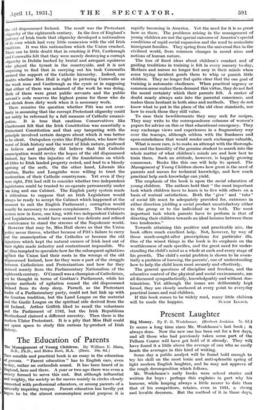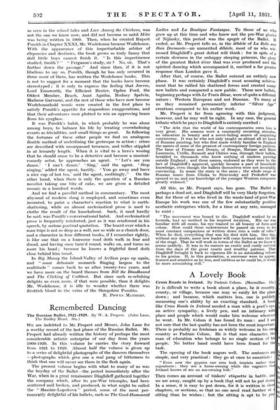Present Laughter
Big Money. By P. G. Wodehouse. (Herbert Jenkins. is. 6d.) IT seems a long time since Mr. Wodehouse's last book ; it always does. Now the new one has been out for a few days, and all those who had previously taken some part of the Pelham Course will have got hold of it already. They will have found it a little above the average of one who so easily heads the averages in this kind of writing.
Some day a public analyst will be found bold enough to try his skill on the most tonic and anti-splenetic spring of light modern English laughter, and he may not approve of the rough decomposition which follows.
Mr. Wodehouse's early books were school stories and written for boys : perhaps this explains in part why his humour, while keeping always a little nearer to date than that of his competitors, retains, even in 1931, a strong and lovable decorum. But the method of it in those days,
as seen in the school tales and Love Among the Chickens, was not the one we know now, and did not become so until Mike was being written in 1909. Then, when he created Rupert. Psmith in Chapter XXXI, Mr. Wodehouse became Wodehouse. With the appearance of this imperturbable arbiter of elegancies and destinies, the book grows so truly funny that dull little boys cannot finish it. '" Is this impertinence studied, Smith ? " Ferguson's study, sir ? No, sir. That's further down the passage." And since then, if it is not libellous to say so, Psmith, though he has only occurred in three more of them, has written the Wodehouse books. This is not to suggest for a moment that the books have .become stereotyped ; it is only to express the feeling that Jeeves,- Lord Emsworth, the Efficient Baxter, Ogden Ford, the Oldest Member, Beach, Aunt Agatha, Rodney Spelvin, Madame Garvarni, and the rest of those who have now become Wodehousehold words were created in the first place to satisfy Psmith's appetite for stupendous exaggerations, and that their adventures were plotted to win an approving beam from his eyeglass.
It was Psmith's habit, in which probably he was alone among boys,- to balance his life by treating overwhelming events as trivialities, and small things as great. In following the fortunes of these other people we find an analogous double method of underlining the grotesque in action : crises are described with unsurpassed terseness, and trifles stippled in at leisurely length. When it is vital to a hero's wooing that he should cease to be a detective and become a musical- comedy actor, he approaches an agent. " Let's see you dance.' I can't dance.' Sing,' said the agent. Stop singing,' added the agent, hastily. ' You go away and have a nice cup of hot tea,' said the agent, soothingly." On the other hand, when there is only the question of a Russian novelist taking one bite of cake, we are given a detailed mosaic in a hundred words.
And we find a parallel method in commentary. The most abysmal of modern slang is employed, and sometimes even invented, to paint a character's reaction to what is earth- shattering, while an almost ecclesiastical prose is used to clothe the result of the knockabout. Such, it need hardly be said, was Psmith's conversational habit. And ecclesiastical prose is frequently reinforced, just as it was reinforced in his speech, by serious poetical quotation. The board over which a man trips is not so deep as a well, nor so wide as a church door, and a character in four different books, if I remember rightly', is like one that on a lonesome road doth walk in fear and dread, and having once turn'd round, walks on, and turns no more his head ; because he knows a frightful fiend cloth close behind him tread.
In Big Money the Island-Valley of Avilion pops up again, and some debonair monarch flinging largess to the multitude " comes back to us after twenty-two years, and we have more on the beard themes from Bill the Bloodhound and The Clicking of Cuthbert. But since such re-relishing delights us even more, if that were possible, than it delights Mr. Wodehouse, it is idle to wonder whether there was Scottish blood in the veins of the Shropshire Psmiths.
E. Powys M-STIIERS.











































 Previous page
Previous page